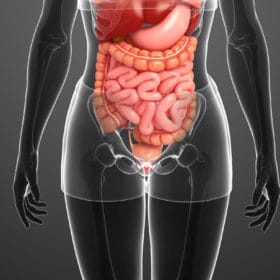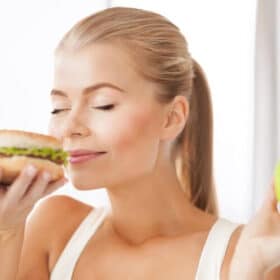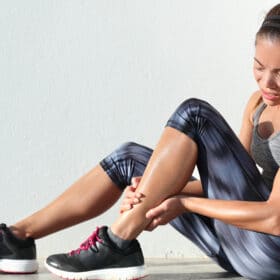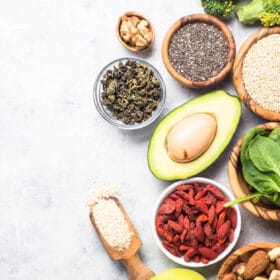When the popular fitness and sports magazines talk about the ideal nutrition programs, almost all nutrition experts agree that eating a lot of protein is a prerequisite for building muscle and maintaining a healthy diet. But what do the Vegetarianwho eat neither meat nor fish? Do they have to fall by the wayside and forget about their desired muscle building? Below we have put together four points that will tell you how you can develop a suitable nutrition program as a vegetarian that is ideal for sustainable and effective muscle building.
1. what kind of vegetarian are you?
In common parlance, vegetarians are people who do not eat meat. However, a vegetarian is actually a person who mainly eats plant-based foods and products from living animals such as eggs, milk or honey. All foods that come from dead animals, such as meat or fish, are avoided. The purpose of this type of diet is to avoid health risks or to follow a certain philosophy of life. Experts distinguish between a total of seven different vegetarian diets:
1. ovo-vegetarian: Meat, fish and milk and dairy products made from it are prohibited.
2. lacto-vegetarians: Meat, fish and eggs and foods made from them are prohibited.
3. ovo-lacto vegetarians: Fish, meat and all foods made from them are prohibited.
4. semi-vegetarian: Eat less meat and prefer a higher proportion of vegetables, cereals and fruit.
5.pudding vegetarian: Meat and fish are forbidden. Instead, they eat sweets and convenience products.
6. raw foodists: Almost all foods derived from animals are forbidden. They only eat uncooked food.
7. vegan: All animal products such as meat, fish, milk and eggs are prohibited.
2. certain proteins are suitable for muscle building
Protein does not always have to come from meat or fish. Vegetarians have many different sources of protein that do not contradict their view of the world and are also useful for building muscle.
1. eggs and dairy products
If your vegetarian diet allows it, you can eat a wide variety of dairy products. Even a small cup of low-fat quark (250g) can contain around 30 grams of protein, which is equivalent to a hand-sized piece of chicken breast fillet! A low-fat cottage cheese also provides 25 grams of protein per 200g tub. Even the boiled hen's egg offers the vegetarian
already 7 grams of protein.
2. legumes
Beans, lentils and peas also contain a lot of protein, but often also a lot of carbohydrates and should therefore not be eaten in the evening due to digestion. The most protein-rich legume is the soybean, which provides around 33 grams of protein per 100 grams. Lentils and peas both provide 23 grams of protein per 100 grams, but also contain 11 grams of carbohydrates.
3. soy products
A well-known soy product is tofu, which provides 12 grams of protein per 100 grams and can be processed in a variety of ways. If you have to do without animal dairy products, you can also eat a cup of soy yogurt (250g) as an alternative, which provides you with 10 grams of protein.
4. nuts & almonds
Nuts are known as good sources of protein and good omega-3 acids, but also contain a lot of fat. Peanuts provide the highest amount of protein with 26 grams of protein per 100 grams, followed by almonds (19g/100g) and walnuts (14g/100g).
5. vegetables
Vegetables can also provide you with plenty of protein as a vegetarian. Spinach in particular contains 2.2 grams of protein per 100 grams. This may not sound like much, but in reality spinach contains almost half of healthy protein. The vegetable with the highest protein content is broccoli, which provides 3.3 grams of protein per 100 grams and contains only 24 calories per 100 grams.
6. cereal products
If you like oatmeal, you should go for it, as this cereal provides almost 13 grams of protein per 100 grams. Oatmeal is perfect as a breakfast with milk and can be prepared with other protein sources such as quark or soy milk. An insider tip is seitan, which is made from wheat protein and used to be eaten as a meat substitute. Seitan contains around 25 grams of protein per 100 grams, but also has almost 40 grams of carbohydrates. Quinoa is also a great grain product for building muscle. It is a grain related to millet and contains all 9 essential amino acids as well as carbohydrates. You can use quinoa to make salads, a delicious casserole and even patties.
3. eat properly
The variety of vegetarian cuisine should also be used correctly when preparing meals, otherwise there is a risk of bloating and constipation. Water is an important component for vegetarians, which is why they make sure they drink at least two liters of water a day. It is also important to include fruit and vegetables, which stimulate the metabolism and ensure good digestion. Around 300 grams of fresh fruit and vegetables per day is recommended. Cereals and potatoes as well as protein products, nuts, seeds and pulses should be covered with two to three portions a week. Vegetable oils such as olive oil are important on a daily basis and should be consumed with two to four tablespoons. Dairy products and eggs contain a lot of protein and should be adapted to the energy consumption or training workload.
4. cover vitamins and vital substances
Vegetarians are often asked how they cover their vitamin and mineral requirements. Below we show you how a vegetarian can ensure a healthy diet.
- Beta-carotene: Apricots, kale, spinach, carrots Sweet potatoes
- Coenzyme Q10: Raw consumption of peanuts, sesame seeds, pistachios, broccoli or cauliflower
- Vitamin C: Berries, citrus fruits, papayas, kiwis, pineapples, etc.
- Vitamin D: Chanterelles, mushrooms, morels,
- Glutathione: Green leafy vegetables, chlorella, asparagus, broccoli, spinach, zucchini, Brussels sprouts, cauliflower, kale and walnuts.
- Vitamin B1: Sunflower seeds, pine nuts, Brazil nuts, poppy seeds, pecan nuts, pistachios, peanuts, cashew nuts and sesame seeds.
- Vitamin B2: Almonds, grated coconut, seeds (pumpkin seeds and sesame seeds), pulses (including soy products such as tempeh), mushrooms (especially button mushrooms)
- Vitamin B3: Pulses, peanuts, peanut butter, pumpkin seeds, pine nuts,
- Vitamin B6: Avocado, peppers, broccoli, cauliflower, spinach and sweetcorn,
- Vitamin B7: Peanuts, legumes, avocados, oatmeal, carrots, chicory, spinach, Vitamin B12 is produced by a healthy intestinal flora.
- Magnesium: Amaranth, quinoa, seaweed,
- Selenium: Brazil nuts, porcini mushrooms, mushrooms, lentils, soybeans
- Potassium: Swiss chard, spinach, lettuce, herbs, celery, kale, broccoli,
- Iron: Pumpkin seeds, sesame seeds, chard, spinach, plantain, purslane, nettle, cress, dandelion,
- Zinc: Nuts, seeds, pumpkin seeds.



